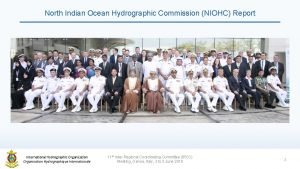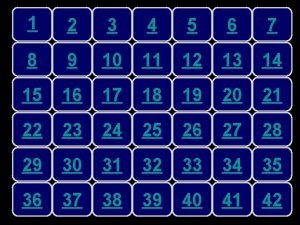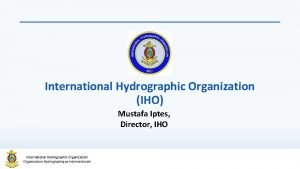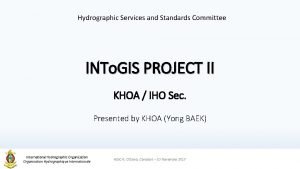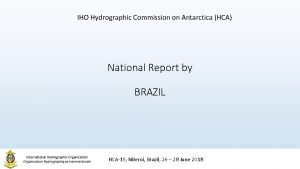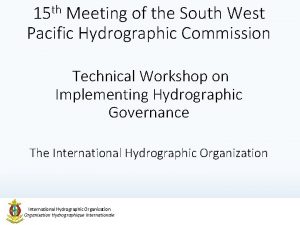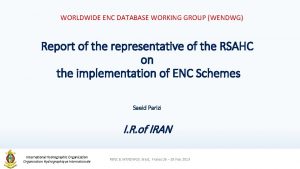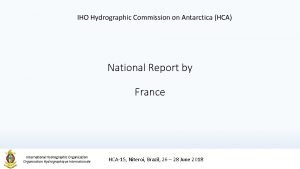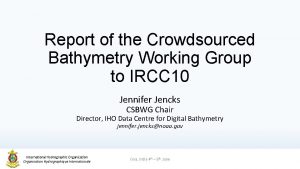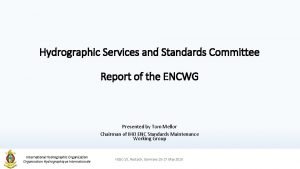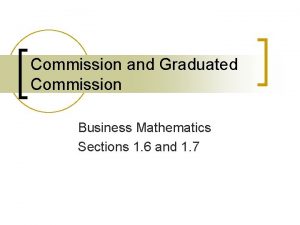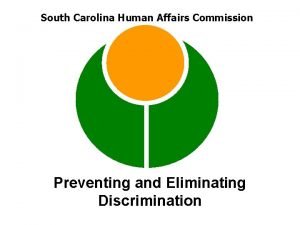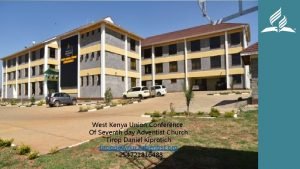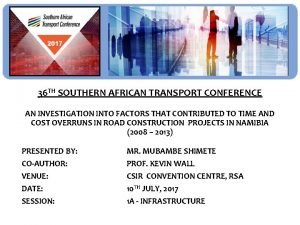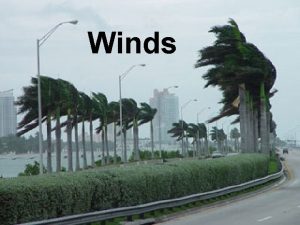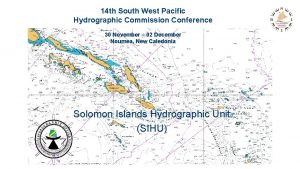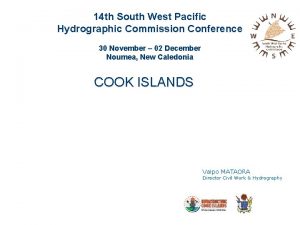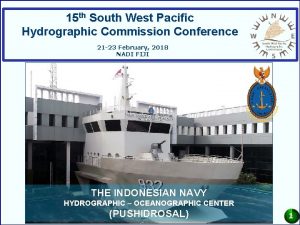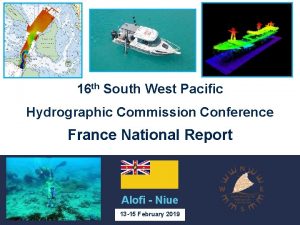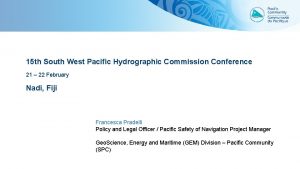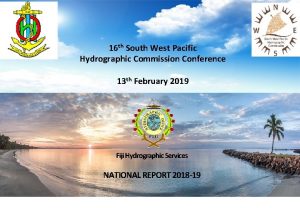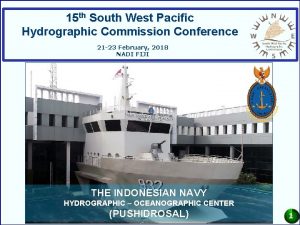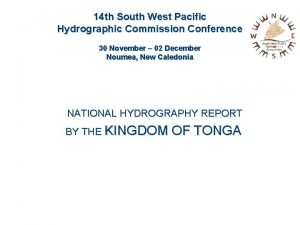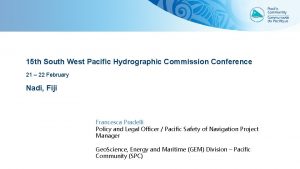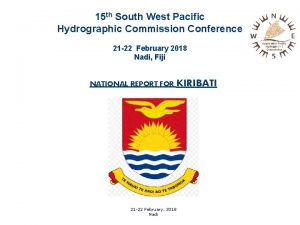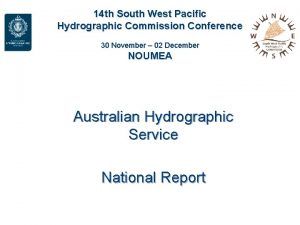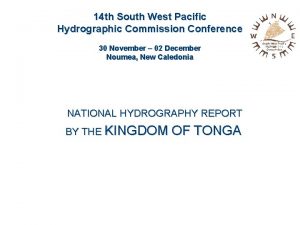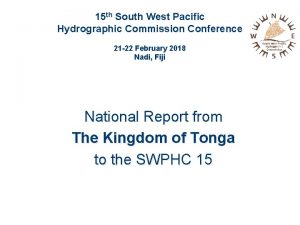14 th South West Pacific Hydrographic Commission Conference


















- Slides: 18

14 th South West Pacific Hydrographic Commission Conference 30 November – 02 December Noumea SPC assistance in the Pacific Region for the PICs preparation towards IMSAS Francesca Pradelli – Policy and Legal Officer SPC - EDD Transport Programme

Regional Assistance SPC has been officially requested to further assist a number of PICs to complete some of the steps identified in the roadmap n 1. Guide in developing a Strategy to implement relevant International Maritime Organization (IMO) instruments 2. Guide to develop a Maritime Transport Policy n Pacific Transport Officials meeting - Suva, Fiji, 24 to 27 November 2015

National Assistance n Maritime Transport Policy 1. n Upon official request SPC assisted Vanuatu, Kiribati, Palau in develop their own national MTP Legal gap analysis in the scope of IMSAS 1. 2. 4 Spreadsheets developed taking into account IMO Resolution A. 1105(29) 2015 Non-Exhaustive list of obligations under instruments relevant to the IMO Instruments Implementation Code Upon official request SPC conducted legal gap analysis in Vanuatu, Tuvalu, Kiribati

14 th South West Pacific Hydrographic Commission Conference 30 November – 02 December Noumea Pacific Safety of Navigation Project Minsu Jeon – Regional Safety Navigation Adviser SPC - EDD Transport Programme

Challenges for Aids to Navigation

Project overview n n Project purpose - Identify the current and future needs for safety of navigation systems including Ato. N procedure for governance and funding, and support the enhancement of the capacity to establish, operate and maintain Ato. N Donor - International Foundation for Aids to Navigation (IFAN) Implementation (5 years) - Preparation Phase – 2016 - Phase I – 2016 -2018, Phase II – 2018 -2021 Target countries - Cook Islands, Kiribati, FSM, RMI, Nauru, Niue, Palau, Samoa, Solomon Islands, Tonga, Tuvalu and Vanuatu

Objective and results Overall objective: Support PICTs economic development, shipping and trade through safer maritime routes managed in accordance with international instruments and best practises. Indicator: Number of PICTs with safety of navigation systems compliant with SOLAS convention chapter V Project purpose: Identify the current and future needs for safety of navigation systems including Ato. N, procedures for governance and funding, and support the enhancement of the capacity to establish, operate and maintain Ato. N. Results Result 1: Identified needs for safety of navigation systems Indicators Result 2: Improved PICTs systems and capacity to establish, operate and maintain Ato. N Number of needs assessment reports completed and endorsed by the targeted countries Number of PICTs staff trained in Ato. N operation and management Number PICTs safety of navigation management systems adopted

Project Activities

Legal Assessment n n Gaps in implementing SOLAS convention Chapter V requirements - Discharging the responsibilities as Contracting Government and Flag and Coastal State The needs of legislation, regulation and procedures - Level of Service - Strategic Plan - Operational Plan - EWMP

Technical Assessment n Support technical capacity in countries to improve Ato. N services On-site survey • Basic survey for 13 target countries Risk assessment • Quantifying the effect on the risk level of an existing port or waterway Investment plan • Initial cost for Ato. N

Technical Assessment n Ato. N Risk Management Tools : • PAWSA: Qualitative (graphical or diagrammatic) aiming to find acceptable and cost effective solutions • IWRAP Mk. II: Quantitative (numerical or tabular) aiming to identify average number of annual collisions and groundings • Simplified Qualitative tool (under development)

Risk Assessment 1 2 3 4 5 • Identify and Prioritize Hazards • Assess the frequency and impact of each risk • Specify Risk Control Options • Make a decision based on stakeholder feedback and ALARP options • Take Action to implement decisions

Economic Assessment Potential Impacts of Maritime incident n n n Loss of life and injury Damage to vessels and cargo PICTs is highly dependent on imports by sea • Disruption in supply of import & export goods n n Environmental damage Damage to reputation Remain high risk means higher cost of shipping

Economic impact of maritime transport Volumes shipping decrease – lower capacity and less business opportunities for shipping industry Eroded competitiveness of exports – decreased exports Higher cost of imported goods – less consumption, less basic needs met Higher cost of shipping Higher cost of inputs for businesses – doing business less profitable Increased barriers to trade – less domestic and international trade

Financial risks n Financial cost from incidents to CA can be very high (up to hundreds of millions of dollars) • However, cost to reduce the risk of these incidents can be reasonable – if appropriate budget is allocated for investment into Ato. N AND properation and maintenance (through e. g. ring-fenced revenue)

Capacity Building n SPC will be accredited the regional training organization in cooperation with IALA n Deliver “Level 1” Ato. N manager course in 2017 in SPC n Facilitate “Level 2” technical training courses

Expected Outputs Activities Expected outputs R 1. 1 Analyse the gaps in discharging the PICTs responsibilities Gaps in implementing SOLAS convention requirements are identified; R 1. 2 Assess the impact of investment Economic analysis of impact of improved safety of navigation systems is provided. The needs of legislation, regulation and procedures for governance of safety of navigation systems are identified. R 1. 3 Propose funding arrangements Funding and investment arrangements for Ato. N systems are proposed; to ensure sustainability of Cost/benefit analysis shows the cost-benefit ratio of investments; investments Budget is available for investment and maintenance of safety of navigation systems. R 1. 4 Identify the current and future needs The needs of Ato. N and other safety of navigation systems are identified; The needs of training for safety of navigation management are identified. R 1. 5 Raise funds for project result 2 Funds confirmed to complement donor funding for phase 2 activities. phase to complement donor funding R 2. 1 Accredit SPC as ATO SPC is accredited as training organisation in accordance with IALA guidelines and recommendations R 2. 2 Support capacity in countries to improve Ato. N services The framework for Ato. N governance is developed or amended; R 2. 3 Provide a regional training of “Level 1” Ato. N managers A regional training is provided to identified and assessed participants. R 2. 4 Facilitate “Level 2” technician training courses conducted A regional training is provided to identified and assessed participants. Funding and investment arrangements

Conclusion n n Maritime transportation and infrastructure underpin all aspects of socio-economic development in the Pacific Region Ato. N is essential infrastructure designed and operated to enhance safe and efficient navigation Current and future needs for safety of navigation will be identified against the challenges of the region Legal, technical and economic assessment will be conducted for the 13 target countries. SPC will be the ATO, and deliver Level 1 course in 2017
 North indian ocean hydrographic commission
North indian ocean hydrographic commission Passed in several western states granger laws
Passed in several western states granger laws Mustafa ipteş
Mustafa ipteş Intogis
Intogis International hydrographic organisation
International hydrographic organisation International hydrographic organisation
International hydrographic organisation International hydrographic organisation
International hydrographic organisation International hydrographic organisation
International hydrographic organisation International hydrographic organisation
International hydrographic organisation International hydrographic organisation
International hydrographic organisation What defects do you find in the existing school curriculum
What defects do you find in the existing school curriculum Graduated commission definition math
Graduated commission definition math Business ethics in west virginia
Business ethics in west virginia South carolina human affairs commission right to sue
South carolina human affairs commission right to sue Sda unions in kenya
Sda unions in kenya South african transport conference
South african transport conference South african transport conference
South african transport conference East is east and west is west
East is east and west is west Winds that blow over short distances are called
Winds that blow over short distances are called
